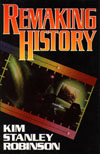
I like Stan’s writing, even when I’m totally unsure of what it is I’m reading. He’s one of the few writers I don’t mind re-reading; if anything, I get more of what I like in his writing during a re-reading, since I then tend to forget about trying to follow the “plot” or “meaning” of the story, and instead just watch the way the words flow. However, even given the above, I tend to like Stan best when I can enjoy the prose and the story.
In this collection, the stories I thought fulfilled both promises were:
- “The Translator”–A perfect bit about being caught in the middle of a culture clash, with only your wits to fall onto. Reminiscent of Stanley Weinbaum (in a good way).
- “Before I Wake”–A truly Philip K. Dick-ian story about consciousness and unconsciousness, in that classic “am I or am I not,” except to show that it’s both.
- “Remaking History”–Actually metafiction, as it is a story about alternate histories, while being an alternate history itself. Simplistic, yet clever.
- “A Sensitive Dependence on Initial Conditions”–Not really a story, but a philosophical essay about choices as view through scientific ideas. Stan is reviewing the theme of his earlier story “Lucky Strike,” with a more mature outlook on the problem. The last line, repeated through the story like a chorus, sends a chill down your spine (in a good way).
The following I enjoyed to a lesser extent:
- “The Part of Us That Loves”–Liked the modernization of the Bible, but didn’t follow the overall story (or, on the other hand, didn’t see that it came to a conclusion).
- “A History of the Twentieth Century, with Illustrations”–Liked the condensation of the history, but wasn’t affected personally by the character change.
- “Vinland the Dream”–Loved the construction of the story (as if it were a scientific journal article), but the story itself didn’t move me.
- “Rainbow Bridge”–Or “Stan Robinson Tries His Hand at Native American Magical Realism.” Some wonderful bits, but the overall story failed to reach me.
- “Muir on Shasta”–Nice description, but too short (length and plot) for a complete story.
- “Glacier”–A textbook example of John Kessel’s Humanist theory of SF. The character reacts to the SF concept, and “changes,” yet affects the concept in no way. The old school hates this sort of stuff. I don’t mind it, but here the change didn’t “touch” me, so I wasn’t affected by it intellectually or emotionally, and was thus disappointed.
- “Down and Out in the Year 2000”–I missed the point of this story when I originally read it in Asimov’s, because at the time I was (and still am, to some extent) enamoured of cyberpunk. This story is Stan’s rebuttal to Neuromancer (and its high-tech/low-life ilk), in which he says low-life can’t afford high-tech, not only to be able to own it, but to have the education necessary to be able to use it, or the mind-set. Entirely valid point and interestingly accomplished in the story; however, I’m not sure that the story holds up by itself, instead requiring a knowledge of the background of its criticism for its true punch.
- “Our Town”–Too short, and felt very similar to other stories of elites (like Robert Silverberg’s “Sailing to Byzantium”). Given a longer story, with more plot/description/substance, I might have been more impressed.
- “A Transect”–Reminded me of Michael Bishop’s “Apartheid, Superstrings, and Mordecai Thubana,” which I feel conveys the same point, but done better.
- “The Lunatics”–Another story that I didn’t quite get on the first reading. Followed it better this time, but still had a sense of uncomprehension at the ending.
- “Zurich”–Heavily autobiographical; once the story moves from the obsessive cleaning to the metaphysical “you won’t be here again,” it lost its appeal for me.
[Finished 10 March 1993]
